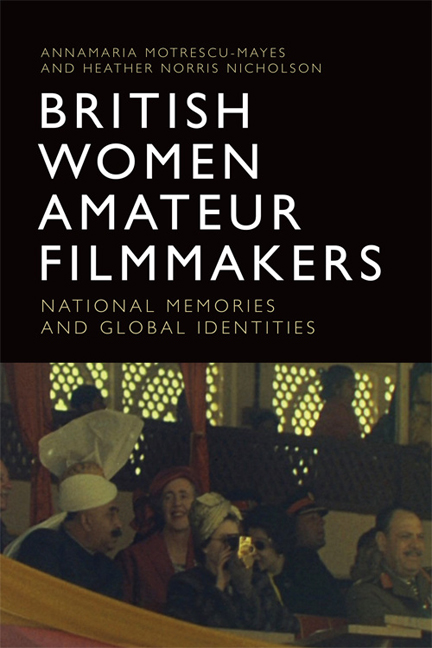Book contents
- Frontmatter
- Contents
- List of Figures
- List of Sources and Abbreviations
- Acknowledgements
- Foreword
- 1 Amateur Women Filmmakers as Producers of Cultural Meaning
- 2 Webs of Production and Practice
- 3 Resisting Colonial Gendering while Domesticating the Empire
- 4 Cameras Not Handbags: The Essential Accessory
- 5 Through Women's Lens: Imperial and Postcolonial Class and Gender Hierarchies
- 6 Teacher Filmmakers
- 7 British Women's Media Narratives of Gender and Collective Memory
- 8 Reimagining Boundaries: Amateur Animations
- Afterword
- Selected Bibliography
- Index
7 - British Women's Media Narratives of Gender and Collective Memory
Published online by Cambridge University Press: 12 November 2019
- Frontmatter
- Contents
- List of Figures
- List of Sources and Abbreviations
- Acknowledgements
- Foreword
- 1 Amateur Women Filmmakers as Producers of Cultural Meaning
- 2 Webs of Production and Practice
- 3 Resisting Colonial Gendering while Domesticating the Empire
- 4 Cameras Not Handbags: The Essential Accessory
- 5 Through Women's Lens: Imperial and Postcolonial Class and Gender Hierarchies
- 6 Teacher Filmmakers
- 7 British Women's Media Narratives of Gender and Collective Memory
- 8 Reimagining Boundaries: Amateur Animations
- Afterword
- Selected Bibliography
- Index
Summary
Two images, four captions and an infinity of possible storylines. The first is a studio portrait showing a woman wearing a beautifully brocaded fin de siècle dress and a young boy in a sailor suit, possibly her son. Ill at ease and with an air of anxious vigilance, the woman sits on a simple white chair, her left hand gripping the armrest. The boy stands by her side, his right hand tucked into his trousers’ pocket and his left hand resting on the other armrest, almost touching the woman's right hand. Neither are smiling. The image has two captions: ‘I was happy to have one mistress only, and she raised our child’, and ‘Their passion fizzled out’ respectively. The second image is a snapshot of four African men recorded in the early 1970s, somewhere on a rural dirt road. One of the men is walking towards the camera, sporting a fashionable hat; another is staring at the camera while posing in front of a utility pole; the third is standing behind them, stopped in mid-action, hands on hips; the fourth man is busy in the background and possibly unaware of the photographer's presence. The two captions for this image read: ‘But she dreamed of far-away places’ and ‘He left for the furthermost away place’. These two photographs belong to a set of thirty-six family photographs reproduced as postcards and used by Valérie Mréjen when designing Images en quête d'histoires (2017) – a media project in which the participants arranged these images to create separate collective histories and personalised narratives. Mréjen's project resembles a Lego-images game which, owing to its multiple narrative options, brings into dialogue media ethics protocols in place when using private or public archival photographs and Umberto Eco's claim that ‘[t]he attempt to look for a final … meaning leads to the acceptance of a never-ending drift or sliding of meaning’ (Eco 1992: 32). Media scholars regularly apply this Lego-style visual narratorial exercise when analysing still or moving amateur images – a by-product methodology prompted by the need to negotiate constructions of collective master narratives in relation to individual visual identity formations. Importantly, issues of gender, race and private memory raised by amateur films, and amateur media in general, whether analogue or digital, amplify the ‘never-ending drift of meaning’ within ongoing contextualised assumptions about what might have been the hotographer's/filmmaker's deliberate or involuntary choice of topics.
- Type
- Chapter
- Information
- British Women Amateur FilmmakersNational Memories and Global Identities, pp. 163 - 195Publisher: Edinburgh University PressPrint publication year: 2018



